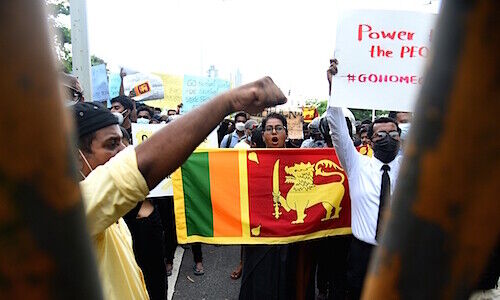One month after Sri Lanka defaulted on its sovereign debt for the first time in its history, global bondholders are looking to pick up the pieces through various forms of recourse.
This week, numerous foreign holders of Sri Lankan debt began to take action in an attempt to recoup funds from the nation of 22 million with an economy that recently appointed Prime Minister Ranil Wickremesinghe said has «completely collapsed».
Earlier this week, Hamilton Reserve Bank – holder of more than $250 million of Sri Lanka’s 5.875 percent bond due July 25 – filed a legal suit in a New York federal court seeking full payment of principal and interest. The Saint Kitts and Nevis-headquartered lender accused Sri Lanka of excluding certain bondholders from an announced restructuring, underlining that the default is being «orchestrated by officials at the highest levels of government».
Separately, more than 30 asset managers holding international Sri Lankan bonds formed a creditor group to start debt restructuring talks with the island nation. Members of the group include asset management giants such as Amundi, BlackRock and T. Rowe Price with Rothschild & Co as their financial adviser, according to a statement from legal advisor White & Case LLC calling on the country to «implement a package of meaningful reforms and fiscal adjustments».
On its side, Sri Lanka has hired Lazard and Clifford Chance as its financial and legal advisors, respectively, to prepare for the debt renegotiations.
Economic Mismanagement
Economic mismanagement coupled with the pandemic has been widely cited as the cause for the collapse of the economy in Sri Lanka, which defaulted on its sovereign debt last month for the first time since gaining independence from Britain in 1948. A lack of foreign exchange has caused shortages of imported essentials, most notably fuel, food and medicine which has led to widespread discontent and protests.
Spotlighted at the center of this catastrophe is the Rajapaksa family which boasts decades of political influence in Sri Lanka with members holding top positions such as President Gotabaya Rajapaksa and recently resigned ex-Prime Minister Mahinda Rajapaksa. The family has been repeatedly accused of various crimes including corruption and human rights abuses over the years which they have consistently denied.
China Debt Collection
Of the over $50 billion in debt owed to foreigners, one creditor that will garner extra attention will be China which is estimated to have lent around $3.5 billion to the country, according to think tank Advocata Institute. The country has been known to be a key lender to developing economies, especially for infrastructure projects through its Belt and Road Initiative, often at high interest rates.
The most notable example of Chinese debt failure in Sri Lanka was based on loans obtained under the Rajapaksa government to build the Hambantota International Port on the southern coast of the island nation. The project commenced in 2008 but after accumulating mounting losses, it rescinded its original agreement and replaced it with a concession agreement in 2017 that granted a 99-year lease of the port alongside 15,000 acres of land nearby to Chinese operator CMPort.
Separately, an International Monetary Fund (IMF) team landed in Sri Lankan capital Colombo on Monday to kick off bailout talks with Prime Minister Wickremesinghe. This will mark the 17th loan program between Sri Lanka and the IMF.


























